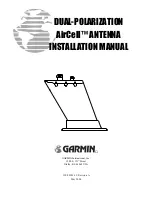
19
INSTALLING THE MOUNT ON CONCRETE OR CONCRETE MASONRY WALLS
INSTALLATION PROCEDURE
Do not drill holes within 12 inches of any discontinuous sur-
face. Also, because small movements of the base plate are
amplified at the mast end, re-plumb whenever instructed to do
so. Orient the mount assembly so the square hole in the base
plate is at the top as in Figure 14 before installation.
1. Place the base plate so that no anchor will be placed closer
than 1 ft. from any discontinuous surface, such as a window,
door, or edge of a wall. If you are installing on a cinder
block surface, place it so the outside holes are positioned
over the block surfaces. Do not drill into the mortar between
the blocks or closer than 2 inches to any mortar joints.
2. Have a helper hold the antenna mast and base plate in place.
Using a carpenter’s level, plumb the antenna mast in at least
two different locations on the side of the mast (see
Figure 21). These two measurements should be at right
angles to each other. If the mast is plumb, go to step 4. Oth-
erwise, loosen the adjustment nuts.
3. Swing the mast until it is plumb with the level. If you are
still unable to plumb the mast, find another site to install the
antenna.
Note: It is essential that the mast be plumb. If you cannot make the
mast plumb at this point, find another installation site.
Note: If you loosen the adjustment nuts at any point during installa-
tion so that you can move or plumb the mast, be sure to tighten them
snugly after re-plumbing the mast.
4. Use a pencil to mark the location of the top center, bottom
center, and four corner holes of the base plate onto the con-
crete surface (Figure 22).
5. Use a 3/8-inch masonry drill bill and drill 3/8-inch x
3-inch holes where you made the pencil marks. Clean out
the holes with a blow out bulb.
6. Place the mount back on the wall, carefully centering the
base plate holes over the holes you just drilled.
7. Plumb the mast.
8. With the bolt flush to the top of the nut, tap the sleeve
anchor to drive it into the hole.
9. Use a torque wrench to tighten the anchors to 10 ft. lbs.
10. Verify that the mast is still plumb and adjust if necessary.
DANGER
• If the antenna contacts electric power lines, you will be
killed or seriously injured.
• Before starting the installation procedure, make sure
there are no power lines nearby.
CAUTION
• Attach the antenna only to concrete masonry (cinder
blocks) or concrete walls at least 8 inches thick.
• Do not attach the antenna to stucco or to masonry
veneered surfaces.
• Do not install anchors within 12 inches from any dis-
continuous surface, such as a window, door, or edge of
a wall.
• Anchors can not be installed in mortar joints or within 2
inches of mortar joints.
• Install the satellite antenna dish only as described in
this manual.
Figure 21
Figure 22
G-
Mast
(top view)
Level
Mast
Plumb vial
Adjustment nut
(2 places)
Pivot bolt
Bubble must
be centered
between
marks
Carpenter's level
Bubble
Bottom center hole
Top center hole
Corner holes
Corner holes
Cinder block
or concrete
Mortar
2 in.
min.
















































